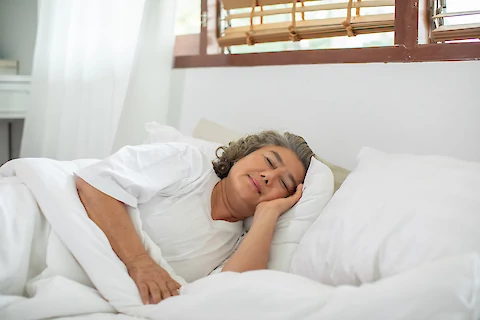
As people age, achieving a good night's rest becomes vital for maintaining overall health, mental well-being, and physical recovery. Yet, many seniors find that their sleep quality declines over time due to a variety of factors such as stress, medical conditions, and lifestyle changes.
If you're a senior looking to catch some more Z's, you're in the right place! In this blog post, we'll explore practical tips and easy-to-implement strategies to help you improve your sleep quality and wake up feeling refreshed and rejuvenated.
Try Stress Management Techniques
One reason seniors may struggle with sleep is stress. To combat stress-related sleep issues, try incorporating relaxation techniques into your daily routine. Deep breathing exercises, progressive muscle relaxation, and guided imagery can help calm your mind and prepare your body for rest. You might also consider meditation, which has been shown to reduce stress and improve sleep quality. If stress is causing severe sleep problems, don't hesitate to consult with your doctor for further guidance.
Establish Healthy Bedtime Routines
Just like when you were a child, establishing a consistent bedtime routine signals to your brain that the time for winding down has arrived. Head to bed and rise from bed around the same timeframe every day. In the hour or two before bed, avoid screen time and engage in relaxing activities like reading, knitting, or taking a warm bath. Also, try to avoid napping too close to bedtime, as it can make it harder to fall asleep at night.
Create a Comfortable Sleeping Environment
Your bedroom should be a sanctuary for rest and relaxation, so make your sleeping space as comfortable as possible. Keep the room at an optimal temperature, which usually falls between 60-67°F. Invest in a comfortable mattress and supportive pillows that suit your sleeping preferences. Eliminate noise and light distractions by using blackout curtains, a white noise machine, or even earplugs if necessary.
Avoid Certain Foods or Drinks Close to Bedtime
What you consume in the evening can significantly impact your sleep quality. Limit your intake of alcohol and caffeine, as both disrupt your sleep. Caffeine may remain in your system for several hours after consumption, so it's wise to avoid drinking any past afternoon hours. Alcohol may initially make you feel drowsy, but it too can interfere with your sleep cycle and lead to fragmented sleep. Additionally, avoid heavy meals and spicy foods before bed, as they can cause indigestion and discomfort. If you're hungry, opt for a light, healthy snack instead.
Incorporate Gentle Exercise During the Day
Regular physical activity is crucial for seniors and can also improve sleep quality. Aim to incorporate gentle exercises into your daily routine, such as walking, swimming, yoga, or tai chi. These activities not only promote overall health but can also help you fall asleep faster and enjoy deeper sleep. Be sure to consult with your doctor before starting a new fitness regimen, especially if you have existing health conditions or concerns.
Work With Senior Helpers Poway
Improving sleep quality as a senior doesn't have to be a daunting task. If you live in Poway, San Diego, or Ramona and need additional support in achieving restful sleep, don't hesitate to contact us at Senior Helpers Poway. Our team of compassionate professionals is here to help you maintain your health and well-being throughout your golden years. Sweet dreams!